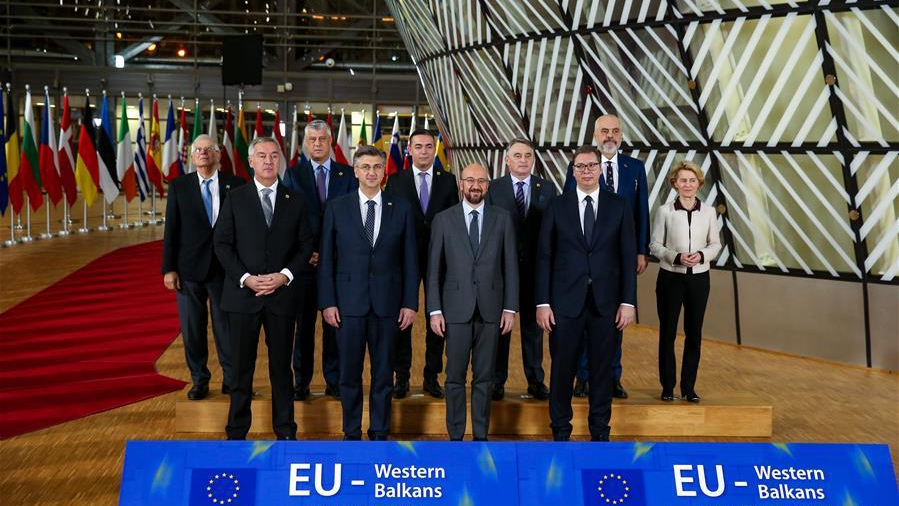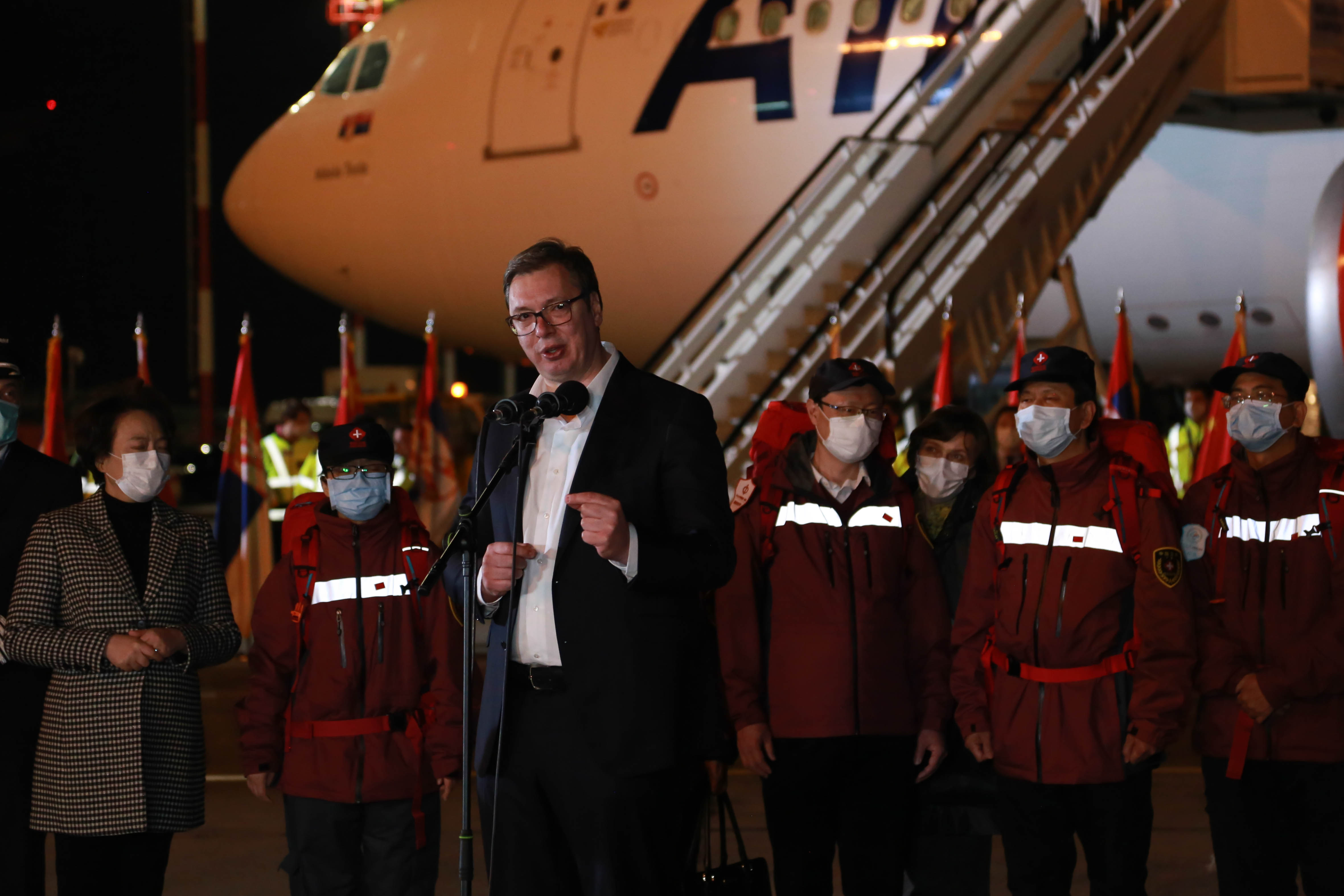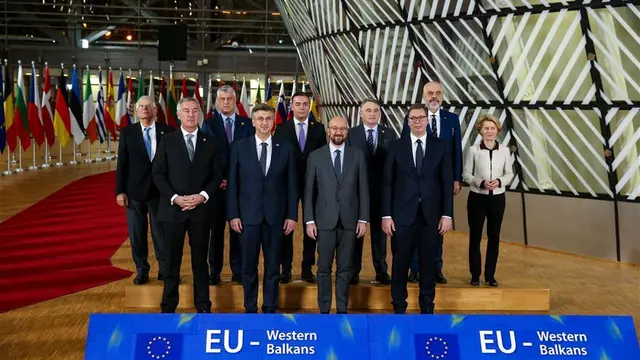
Leaders pose for a group photo before the EU-Western Balkans informal meeting at EU headquarters in Brussels, Belgium, February 16, 2020. /Xinhua
**Editor's note: **Hamzah Rifaat Hussain is a former visiting fellow at the Stimson Center in Washington and currently serves as an assistant researcher at the Islamabad Policy Research Institute (IPRI) in Pakistan. The article reflects the author's opinions and not necessarily the views of CGTN.
The Zagreb summit 2020, which is set to take place shortly, could well and truly become a battleground between EU member states and the Balkans over the former exerting their influence over the COVID-19 pandemic response in Europe.
The summit is taking place 20 years afterEU member states and Balkan countries first came together and will be characterized by the representation of the heads of states of Kosovo, Albania, Bosnia and Montenegro with 27 other EU leaders.
In the lead up the summit, however, the bone of contention has been the praise directed at Russia and China's provision of medical aid from Balkan states, such as Bosnia and Serbia, which has irked the EU.
What ideally is supposed to be another forum for finding tangible solutions for countries ravaged by COVID-19 may actually translate into yet another platform for political scoring, bickering and power rivalry as the Balkans is increasingly pressured to change course.
The Balkans states have been criticized for sidelining 3.6 billion U.S. dollars in aid from the EU, which many officials feel outweigh the personal protective equipment and other medical equipment Moscow and Beijing gave to Serbia and Bosnia.
The timing of this criticism, however, warrants greater attention, given that a collective, unified response by the EU has so far been absent and is needed to allay the concerns of non- EU member states. Such censuring also highlights how Europe's pandemic response could once again fall prey to another instance of increased pressure politics since the pandemic hit its shores.
In retrospect, this castigation of the Balkans for not acknowledging EU efforts and directing approbation toward China and Russia instead fails to factor in the EU's initial timid response to COVID-19 in Italy, which eventually resulted in the President of the European Commission, Ursula Von Der Leyen, issuing an apology.
In addition, both Germany and France imposed export bans on essential medical equipment, which disproportionately affected Italy, as cases started to rise domestically, and the health infrastructure in the country became exhausted. Furthermore, no EU member state responded to Italy's initial plea for aid.
Now, what is being witnessed is a slew of astounding criticism being directed at states that were ravaged by the 1990 separatist conflicts and the Yugoslav wars and are still not members of the European Union.
In Serbia and Bosnia, both President of Serbia Aleksandar Vucic and Serb member of the Bosnian tripartite presidency Milorad Dodik have praised Beijing and Moscow for supplying necessary medical equipment to their countries.

Serbian President Aleksandar Vucic (center) speaks at the ceremony welcoming the Chinese medical team in Belgrade, Serbia, March 21, 2020. /Xinhua
Brussels has also been criticized for not doing enough to provide timely aid to non- EU member states. Dodik went as far as to issue a Eurosceptic statement claiming that "Europedoes not exist today," highlighting the frustration over a bloc that continues to lack credibility as far as the need for swiftapolitical policies to tackle the pandemic is concerned.
The praise heaped on China and Russia can also be justified on the merit of the simple assumption that countries committed to providing unconditional aid worldwide have filled a vacuum that the EU member states' laxity and incompetence created.
Such assistance to the Balkan states by countries such as China is similar to relationships that have been forged based on mutual trust between countries across the globe, many of whom seek to adopt best practices in dealing with the pandemic, such as Pakistan has in South Asia.
There are still some major developments in Europe, however, that could allow for greater cooperation with Balkan states and avert Euroskepticism and animosity. In March, Albania and North Macedonia managed to secure approval for starting EU membership talks, which essentially lays the foundation for greater cooperation.
Yet what is being witnessed in the prelude to Zagreb summit 2020is the constant, unabated badgering of Balkan states in an attempt to discredit Chinese and Russian efforts to reach out to states in need.
Lingering diplomatic tensions have also added to the calls for the Balkans to distance themselves from Russia and China on COVID-19. Currently, five EU member states do not recognize the independence of Kosovo, which acts as an impediment toward greater EU-Balkan dialogue.
The initial fiscal response to COVID-19 in Europe, which entails a sum of 3.5 trillion U.S. dollars for all EU member states, was preceded by severe differences between member states as Germany has to address growing opposition from the Netherlands to support Italy.
Instead of allaying fears and suspicions and adopting a non-discriminatory approach toward providing medical supplies to tackle the pandemic, several prominent capitals of EU member states are setting a dangerous precedent of repeating the same mistakes of laxity and incompetence as was initially made when the pandemic broke out in Italy.
With Euroskepticism growing and Brexit materializing in February, serious questions as to the efficacy of the bloc in dealing with regional issues continue to be unresolved.
The divide between a fiscally conservative north and a largely indebted south among member states necessitates proactive diplomacy to avoid further bottlenecks to a coordinated response. For the EU, addressing their own shortcomings instead of criticizing humanitarian initiatives from Moscow and China in the Balkans is the need of the hour.
(If you want to contribute and have specific expertise, please contact us at [email protected])
 简体中文
简体中文

